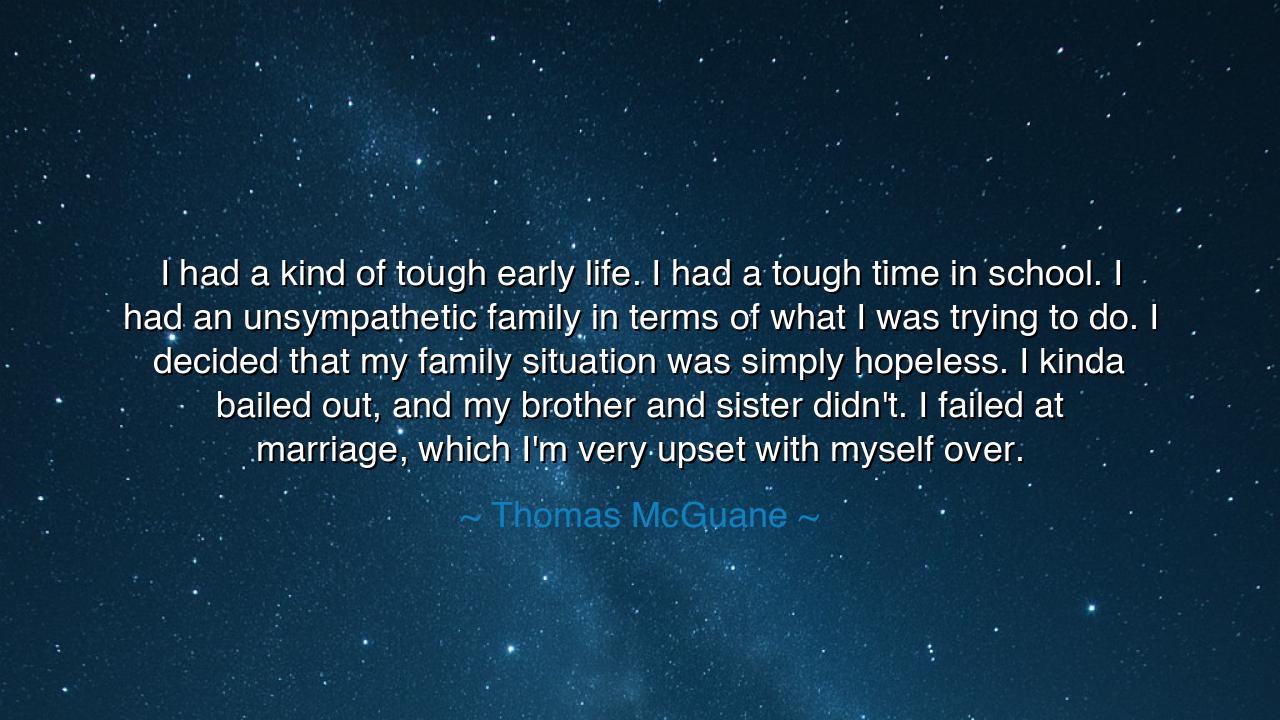
I had a kind of tough early life. I had a tough time in school. I
I had a kind of tough early life. I had a tough time in school. I had an unsympathetic family in terms of what I was trying to do. I decided that my family situation was simply hopeless. I kinda bailed out, and my brother and sister didn't. I failed at marriage, which I'm very upset with myself over.






O Children of the Future, gather closely and hear the words of Thomas McGuane, whose reflections on struggle, failure, and personal growth remind us that the path to wisdom and understanding is often wrought with hardship. He shares, "I had a kind of tough early life. I had a tough time in school. I had an unsympathetic family in terms of what I was trying to do. I decided that my family situation was simply hopeless. I kinda bailed out, and my brother and sister didn't. I failed at marriage, which I'm very upset with myself over." These words, deeply human in their honesty, reveal a soul torn by the weight of personal disappointment and the struggles of a life that did not follow the path he had hoped for. McGuane’s tale is one of failure, but it is also a tale of self-awareness and the eventual search for redemption.
In the ancient world, O Children, failure was not seen as a mere misstep but as a turning point, a test of character that could define a person for the rest of their life. The great philosopher Socrates often spoke of the human soul’s journey, one in which errors and mistakes were an inevitable part of the process of learning. He believed that the key to wisdom was not the absence of failure, but the ability to reflect upon it, to turn it into an opportunity for growth. Aristotle, too, spoke of the virtue of perseverance in the face of adversity, teaching that it is not how one falls that matters, but how one rises. For McGuane, the pain of his early failures—in school, in his family life, and in marriage—became the soil from which his eventual growth would sprout.
Consider, O Children, the story of Odysseus, the hero of Homer’s epic, who faced countless failures and setbacks on his journey home. Each trial, from the blinding of Polyphemus to the treacherous crossing of the seas, tested his resolve and willpower. Yet it was not his successes that made him legendary, but his refusal to give up, his ability to rise again after each fall. Odysseus understood that failure was not the end of the road, but rather an integral part of the hero’s journey. Just as McGuane reflects on his own failures—the unsympathetic family, the marital struggles—he too, like Odysseus, must confront his trials, not as permanent markers of defeat, but as lessons on the way to becoming something greater.
The struggles McGuane recounts—his difficult school life, his decision to break away from his family, and the failure of marriage—are not isolated events but universal experiences that many face. There is a shared humanity in these struggles. How many, O Children, have faced the weight of family expectations, only to find them unsupportive or unforgiving? How many have ventured into marriage, only to find that the reality does not live up to the dreams? These experiences are wounds that many carry, but they do not define us. The story of McGuane’s life is the story of resilience, of facing the inner turmoil that arises from such personal struggles, and then using that pain as fuel for personal transformation.
The lesson, O Children, is this: failure is not something to be feared, nor is it a permanent stain upon your character. It is, rather, a necessary teacher. When McGuane reflects on his own failures with regret and self-criticism, it is a recognition of the deeper truth that every life is made up of both successes and missteps. The key is not to avoid failure, but to embrace the wisdom that it brings. We are not defined by our falls, but by our ability to rise from them, to learn, and to evolve into the people we are meant to be. Just as Odysseus’ journey was filled with losses, but also with growth, so too can you find strength in the midst of your own personal trials.
O Children, you must also understand that failure is often an invitation to self-awareness. In McGuane’s words, we hear the voice of a man who, through his mistakes, came to understand his limitations and, more importantly, his desires. To fail is to see clearly that what you once wanted may no longer be true, and in that realization lies the possibility for new beginnings. Failure is not a dead end, but a doorway through which you must pass on the way to greater wisdom, strength, and clarity.
So, O Children, what should you do in the face of your own failures? You must acknowledge them, not with shame, but with courage and self-compassion. Reflect upon them, learn from them, and grow. Do not be afraid to fail, for in failure lies the seed of your greatest transformation. Persevere, and in your perseverance, you will become the hero of your own journey, just as the greatest figures of history did. Rise from the ashes of your defeats, and in doing so, you will find a wisdom and strength that will guide you through all of life’s trials. And remember, O Children, the true measure of a life is not in the absence of failure, but in the presence of the courage to face it and to keep moving forward, always striving toward the best version of yourself.






AAdministratorAdministrator
Welcome, honored guests. Please leave a comment, we will respond soon